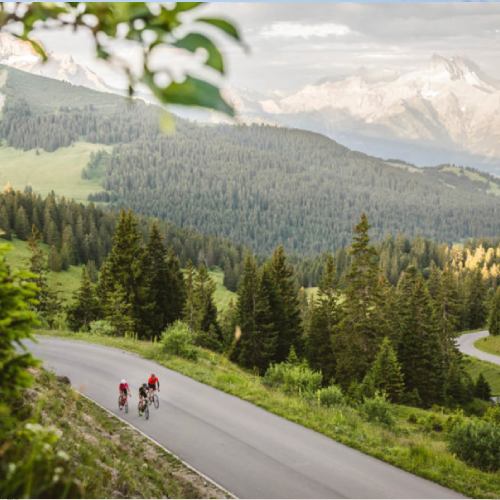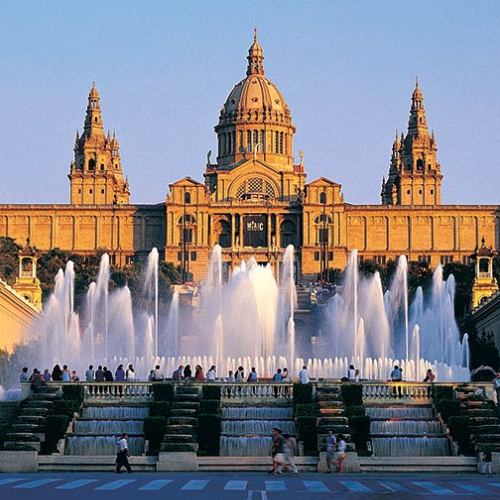
Flight
Accommodation
Sightseeing
Meal
Europe Tour Packages
Planning an international holiday? There are several Europe tours to choose from.
Europe is not just a continent in the Northern Hemisphere, it is a bubbling cauldron of artistic heritage, culinary traditions, nature trails, lofty peaks, windswept fjords, sunny shores, fairy-tale castles, and Mediterranean sunsets coming together in a breathtaking voyage through history. There is no way you are going to travel through Europe and not be struck by its stunning landscapes and its vast ethnic diversity. But if you are a first-timer to Europe and are confused about the cities to pick for your upcoming holiday, here’s a guide that will give you a peek into the great continent for its cultural lineage, rich history, splendid scenery, and great tipples.
Popular Europe Packages

Genuine Europe
INCLUSIONS
• 11 NIGHTS' ACCOMMODATION
•TRAVEL BY BUS WITH ENGLISH SPEAKING GUIDE, BASIC TRAVEL INSURANCE AND BREAKFAST BUFFET.
• INCLUDES ARRIVAL TRANSFER (OPTIONAL DEPARTURE TRANSFER)
• CITY TOUR IN: ROME, FLORENCE, VENICE, PARIS, LONDON.
•BOAT: TO THE ISLAND OF VENICE, BOAT TRIP ALONG
RIVER SEINE IN PARIS
• EVENING TRANSFER: TRASTEVERE IN ROME, VIA CAVOUR
•IN ROME, LATIN QUARTER OF PARIS, TOWER BRIDGE IN
•LONDON, LEICESTER/SOHO AREA IN LONDON
• TRANSFER: PIAZZALE MICHELANGELO IN FLORENCE, CAMDEN DISTRICT IN LONDON
• TICKET ADMISSION: COLISEUM OF ROME, SAINT MARK'S
•BASILICA AND MURANO GLASS FACTORY IN VENICE, 2"
•FLOOR EIFFEL TOWER IN PARIS
•FERRY: CALAIS ER TO DOVER UK
•Funicular: Cable Car to Grindelwald First
11 Night/12Days

A Life en Rose
INCLUSIONS
• 10 NIGHTS' ACCOMMODATION
•TRAVEL BY BUS WITH ENGLISH SPEAKING GUIDE, BASIC TRAVEL INSURANCE, AND BREAKFAST BUFFET.
• INCLUDES ARRIVAL TRANSFER (OPTIONAL DEPARTURE TRANSFER)
• CITY TOUR IN: PARIS, LONDON, EDINBURGH, DUBLIN
•BOAT TRIP ALONG RIVER SEINE IN PARIS, ON THE LOCH NESS
• EVENING TRANSFER: MONTMARTRE DISTRICT OF PARIS, LATIN QUARTER OF PARIS, TOWER BRIDGE IN LONDON, LEICESTER/SOHO AREA IN LONDON
• TRANSFER: CAMDEN DISTRICT IN LONDON
• TICKET ADMISSION:2nd FLOOR EIFFEL TOWER IN PARIS, URQUHART CASTLE
•FERRY: CALAIS FR TO DOVER UK, SCOTLAND-IRELAND
•Funicular: MONTMARTRE IN PARIS
10 Night’s /11 Days

A Fantastic Route
Included:
01. 15 Nights' Accommodation
02. Travel By Bus With English Speaking Guide,
Basic Travel Insurance And Breakfast Buffet.
03. Includes Arrival Transfer (Optional Departure Transfers)
04. City tour in MADRID, Poblet, BARCELONA, ROME, FLORENCE, VENICE, VIENNA
05. Boat: to the island of Venice, Traunsee lake in Traunkirchen
06. Evening transfer: Debod Temple and Plaza de España and
Plaza de Oriente in Madrid, Via Cavour in Rome, City Hall Square in Vienna
07. Transfer: Piazzale Michelangelo in Florence
08. Ticket admission: Las Ventas bullring in Madrid, Poblet Monastery, Carrieres de Lumiere show, Chillon castle; Cailler chocolate factory, Coliseum of Rome, Saint Mark's Basilica and Murano Glass Factory in Venice
09. Train: Montserrat Monastery, Piazza dei Miracoli in Pisal
10. Funicular: Kitzbuhel
11. 2 Dinner included in: LEYSIN, KITZBUHEL
15 Night’s /16 Days

Central European Pearl End Budapest
INCLUSIONS
• 07 NIGHTS' ACCOMMODATION
•TRAVEL BY BUS WITH ENGLISH-SPEAKING GUIDE, BASIC TRAVEL INSURANCE, AND BREAKFAST BUFFET.
• INCLUDES ARRIVAL TRANSFER (OPTIONAL DEPARTURE TRANSFER)
• CITY TOUR IN: PRAGUE, VIENNA, BUDAPEST
•BOAT: VLTAVA RIVER IN PRAGUE, TRAUNSEE LAKE IN TRAUNKRICHEN, DANUBE RIVER IN BUDAPEST
• EVENING TRANSFER: OLD TOWN SQUARE IN PRAGUE, CITY HALL SQUARE IN VIENNA, VACI UTCA IN BUDAPEST
• TICKET ADMISSION: PRAGUE CASTLE, BMW WELT IN MUNICH SWAROVSKI CRYSTAL MUSEUM
•FUNICULAR: KITZBUHEL
• 7 DINNERS INCLUDED IN: PRAGUE,INNSBRUCK, KITZBUHEL,VIENNA, BUDPEST
07 Nights/08 Days

Madrid To Rome
INCLUSIONS
• 10 Nights' Accommodation
• Travel By Bus With English Speaking Guide, Basic Travel Insurance & Breakfast Buffet.
• Includes Arrival Transfer (Optional Departure Transfer)
• City tour in Madrid, Poblet, Barcelona, Rome
• Evening transfer: Debod Temple and Plaza de España and Plaza de Oriente in Madrid, Via Cavour in Rome
• Ticket admission: Las Ventas bullring in Madrid, Poblet Monastery, Carrieres de Lumiere show, Chillon castle; Cailler chocolate factory, Coliseum of Rome
• Train: Montserrat Monastery, Piazza dei Miracoli in Pisa
• 1 Dinner Included in Leysin
10 NIGHTS/11 DAYS

Barcelona to Zurich With Paris
INCLUSIONS
• 07 NIGHTS' ACCOMMODATION
•TRAVEL BY BUS WITH, ENGLISH SPEAKING GUIDE, BASIC TRAVEL INSURANCE AND BREAKFAST BUFFET.
• INCLUDES ARRIVAL TRANSFER (OPTIONAL DEPARTURE TRANSFER)
• CITY TOUR IN: BARCELONA,PARIS
•BOAT: RIVER SEINE IN PARIS
• EVENING TRANSFER: QUARTIER LATIAN IN PARIS
•TICKET ADMISSION: CARRIERS DE LUMIERE SHOW, CHILLON CASTLE; CAILLER CHOCOLATE FACTORY,2ND FLOOR EIFFEL TOWER IN PARIS
•1 dINNER INCLUDED IN :LEYSIN
07 NIghts/08Days

Mediterranean & Balkans
INCLUSIONS
• 07 NIGHT'S ACCOMMODATION
•TRAVEL BY BUS WITH ENGLISH SPEAKING GUIDE, BASIC TRAVEL INSURANCE, AND BREAKFAST BUFFET.
• INCLUDES ARRIVAL TRANSFER (OPTIONAL DEPARTURE TRANSFER)
• CITY TOUR IN: ROME, FLORENCE, VENICE,
•BOAT: TO THE ISLAND OF VENICE,
• EVENING TRANSFER: TRASTEVERE IN ROME, VIA CAVOUR IN ROME
• TRANSFER: PIAZZALE MICHELANGELO IN FLORENCE
• TICKET ADMISSION: COLISEUM OF ROME, SAINT MARK'S BASILICA AND MURANO GLASS FACTORY IN VENICE
TRAIN:PIZZA DEI MIRACOLI IN PISA
• FUNICULAR: CABLE CAR TO GRINDELWALD FIRST
•1 LUNCH INCLUDED IN :LUCERNE
07 Nights/08Days

Classical Spain With Paris (Iberian Peninsula & Morocco)
INCLUSIONS
• 09 NIGHTS' ACCOMMODATION
•TRAVEL BY BUS WITH ENGLISH SPEAKING GUIDE, BASIC TRAVEL INSURANCE, AND BREAKFAST BUFFET.
• INCLUDES ARRIVAL TRANSFER (OPTIONAL DEPARTURE TRANSFER)
• CITY TOUR IN: MADRID SEVILLE, BOAT TRIP ALONG RIVER SEINE IN PARIS
•BOAT: GUADALQUIVIR RIVER IN SEVILLE, BOAT TRIP ALONG RIVER SEINE IN PARIS
• EVENING TRANSFER:DEBOD TEMPLE,PLAZA DE ESPANA, AND GRAN VIA IN MADRID ,PLAZA DE ORIENTE IN MADRID ,ALBAICIN IN GRANADA,HISTORIC CENTER OF SEVILLE RAMBLAS AND PLAZA DE CATALUNYA IN BARCELONA,LATIN QUARTER OF PARIS
•TICKET ADMISSION: LAS VENTAS BULLRING IN MADRID, ALHAMBE=RA PLACE AND GENERALIFE GARDENS (IF INCLUDING IN THE TOUR) IN GRANADA, POBLET MONASTERY POBLE ESPANYOL IN BARCELONA,2ND fLOOR EIFFEL TOWER IN PARIS
•TRAIN: MONTSERRAT
•HIGH-SPEED TRAIN: SEVILLE-ZARAGOZA, BARCELONA TO PARIS
•1LUNCH INCLUDED IN: GRANADA
09 Nights/10Days

Adventurous Europe
INCLUSIONS
• 15 NIGHTS' ACCOMMODATION
•TRAVEL BY BUS WITH ENGLISH SPEAKING GUIDE, BASIC TRAVEL INSURANCE, AND BREAKFAST BUFFET.
• INCLUDES ARRIVAL TRANSFER (OPTIONAL DEPARTURE TRANSFER)
• CITY TOUR IN: PARIS, ROME, FLORENCE, VENICE, VIENNA
•BOAT: RIVER SEINE IN PARIS, ZURICH LAKE, TO THE ISLAND OF VENICE, TRANSFER: MONTMARTRE DISTRICT IN PARIS, QUARTIER LATIN IN PARIS, VIA CAVOUR IN ROME, CITY HALL SQUARE IN VIENNA
•TRANSFER: PIAZZALE MICHELANGELO IN FLORENCE
•TICKET ADMISSION: FUNICULAR IN MONTMARTRE IN PARIS,2ND FLOOR EIFFEL TOWER IN PARIS, COLISEUM OF ROME, SAINT MARK'S BASILICA AND MURANO GLASS FACTORY IN VENICE
•TRAIN:RAPPERWIL/ZURICH, PIAZZA DEI MIRACOLI IN PISA
•FUNICULAR :LYON CABLE CAR TO GRINDELWALD FIRST,KITZBUHEL
•1LUNCH INCLUDED IN LUCERNE
•1DINNER INCLUDED IN KITZBUHEL
09 Nights/10Days
Europe Tour Packages FAQs
Q. What does it cost to travel to Europe?
A. If you are traveling on a budget, you will need an estimated average of about INR 4000 to 6500 per day if this is in Western Europe. The average will be slightly lower if you were to pick Eastern Europe. However, be mindful of the fact that this does not entail the cost of your air tickets or any other form of transportation.
Q. Would I require a travel insurance?
A. While it is not a necessity, it is however better to have one. Your OTA from whom you buy your Europe holiday package can arrange the same for you.
Q. Should I be carrying my Euros and Pounds before leaving for the trip?
A. Do not carry too much cash in hand when starting your journey because your local bank may not be able to provide you with the best exchange rate. About 200 Euros are good to begin with. But once you arrive in Europe and you begin to withdraw the cash from ATMs, you are expected to get a better currency valuation. A multi-currency card always comes in handy and is a good idea to carry one on your trip.
Q. What is a better way of getting around, a debit card or a credit card?
A. It is just to carry both provided they are put to different uses. Limit your debit card usage to only ATM withdrawals because the card can get easily copied or skimmed. The chances of theft of debit card money is also averted by doing so. A credit card, on the other hand, works better for paying for your purchases unless of course you decide to use cash. It is good to carry a couple of credit cards in case one doesn’t work.
Q. Is it good to have a rail pass for my train travels?
A. Rail pass gives you the flexibility to travel whenever you wish. Get yourself a single ticket for a high-speed train as it works out cheaper than buying rail tickets about a couple of months ahead. A rail pass is always the more economical option in case you are buying your ticket a couple of days in advance or even on the day of the journey.
Q. Is train or flight a better and cheaper way to travel around in Europe?
A. The railway connectivity across destinations in Europe is stellar and is most definitely the better way of travelling across the continent. Also, railway stations are always in the city centre and from one city centre to the other in under five hours is not a bad way of getting around. Add to it the stunning scenery along the way. But for very long journeys, opt for a flight as it is would be more economical, and any day faster. There are several budget airlines operating flights within Europe and you can conveniently fly one of them.
Q. How about driving around in Europe?
A. Roads across Europe are in great condition and offer an unparalleled scenery. It is in fact the best way to get to smaller towns, hill stations and the countryside. However, you must avoid driving in main, big cities because of the chaotic traffic, when a train or a bus is a better way of getting around. You will need an international drivers licence to be able to drive around in Europe. Also you need to study the driving rules of different European cities thoroughly before getting behind the wheel and zipping through.
Q. Is it safe to leave my backpack or luggage behind during the day on a hostel stay?
A. Yes, most hostels provide lockers for you to stash your belongings because only you would have the key to that lock. There are several hostels that have luggage rooms allowing you to keep your belongings in case you arrive ahead of your check-in time. Even hotels have this facility including letting you keep your bags for a while after you have checked out.
Q. How much should I be packing for my Europe trip?
A. The adage ‘pack light’ does indeed hold water and makes your travelling around easier and more comfortable. Mostly it depends on the season in which you are visiting. For example, a winter visit warrants heavy jackets, windcheaters, waterproof shoes, a raincoat for the occasional rainfall, mufflers and caps. Summer destinations are best explored in light cotton clothing, but make sure you have a bottle of drinking water and a sunscreen lotion tucked away in your bag.
Q. Would I need a separate phone number in Europe?
A. You can buy a local SIM or get an international plan worked out by your service provider in your home country. But when buying data card etc you would need to produce valid documents such as passport at the point of sales.

